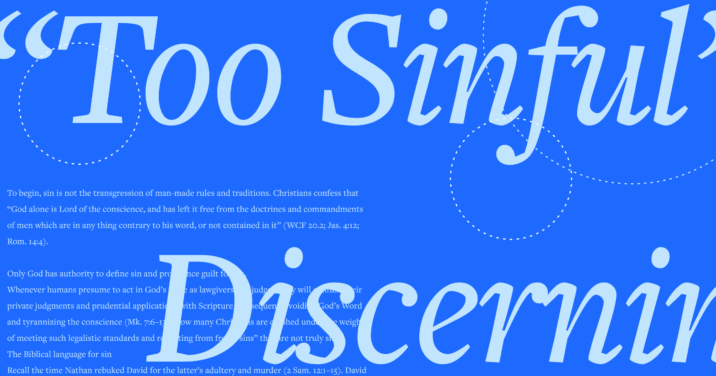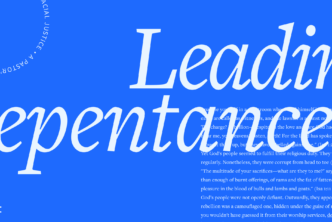“Am I sinning?” This is an inevitable question those in ministry will be asked. Christians want to know whether or not particular thoughts, words, and deeds are sinful. A glance at recent Google monthly search metrics reveals how anxious people are about this question:
- “Is masturbation a sin?” (22,000/mo.)
- “Is being gay a sin?” (15,000/mo.)
- “Is gambling a sin?” (10,000/mo.)
- “Is smoking a sin?” (10,000/mo.)
- “Is smoking weed a sin?” (7,000/mo.)
- “Is swearing a sin?” (8,000/mo.)
- “Is getting a tattoo a sin?” (7,000/mo.)
- “Is yoga a sin?” (4,000/mo.)
- “Is watching porn a sin?” (4,000/mo.)
- “Is abortion a sin?” (3,000/mo.)
- “Is divorce a sin?” (2,000/mo.)
As helpful as the world’s most powerful search engine may be (or not) in helping people find answers to their questions, Google does not replace careful instruction from pastors and church leaders.
But where to begin? What categories are necessary to help others rightly discern sin and ultimately enjoy rest and freedom in Christ?
- Christians need to know how to define sin. Not all that is called “sin” is truly sin and some of what is deemed “not sin” is truly sin. If we cannot define sin, we won’t rightly discern sin.
- Christians need categories for discerning sin. I will give attention to two in particular: (1) listening to the conscience and (2) going to God’s law.
Table of contents
Defining sin
In the absence of good definitions for sin, both false guilt and presumed innocence abound, diluting the Christian gospel and destroying Christian liberty. One aim of Christian ministry is freeing beleaguered saints from false guilt over actions and attitudes for which God will not hold them accountable, and binding them to godly guilt for actual sins. To these ends, Christian leaders need to carefully define what sin is and is not.
God alone is lawgiver
To begin, sin is not the transgression of man-made rules and traditions. Christians confess that “God alone is Lord of the conscience, and has left it free from the doctrines and commandments of men which are in any thing contrary to his word, or not contained in it” (WCF 20.2; cf. Jas 4:12; Rom 14:4).
Only God has authority to define sin and pronounce guilt for sin.
Whenever humans presume to act in God’s place as lawgivers and judges, they will confuse their private judgments and prudential applications with Scripture, consequently voiding God’s Word and tyrannizing the conscience (Mark 7:6–13). How many Christians are crushed under the weight of meeting such legalistic standards and repenting from “sins” that are not truly sin?
The biblical language for sin
Recall the time Nathan rebuked David for the latter’s adultery and murder (2 Sam 12:1–15). David was immediately cut to the heart: “I have sinned against the Lord!” (12:13 ESV). Following this, the disgraced king, carried along by the Holy Spirit, poured his sorrow for sin into a song. In Psalm 51, David aggregates a breadth of biblical language to describe his actions not merely as “sin” (see the root חטא in vv. 2, 3, 4, 5, 9, and 13) but also as “transgressions” (פֶּ֫שַׁע; vv. 1, 3), “iniquity” (עָוֹן; vv. 2, 5, 9), “evil” (רַע; v. 4), and “bloodguiltiness” (דָּם; v 14). Each word adds its own definitive stroke to a scriptural portrait of sin.
The New Testament supplies a similar panoply of words, including but not limited to “sin” (ἁμαρτία; Rom 5:21), “the flesh” (σάρξ; Rom 7:18; 8:13), “unrighteousness” (ἀδικία; Rom 1:18, 29), ungodliness (ἀσέβεια; Rom 1:18; Jude 15), “transgression” (παράβασις; Gal 3:19), “trespass” (παράπτωμα; Rom 5:20), and “impurity” (ἀκαθαρσία; Rom 1:24; Eph 4:19).

Conduct a study of the biblical words for sin using Logos’s Bible Sense Lexicon.
“Sin is lawlessness”
These loaded terms are theologically summed up in a single statement by the beloved apostle: “Everyone who makes a practice of sinning [ἁμαρτία] also practices lawlessness [ἀνομία]; sin is lawlessness” (1 John 3:4 ESV; italics mine).
Some additional inferences necessarily follow John’s statement:
1. All actual sin is a deviation from God’s law
The Westminster Larger Catechism assumes both when it defines sin as “any want of conformity unto, or transgression of, any law of God, given as a rule to the reasonable creature” (WLC Q.14).
2. Sin is objectively defined
It is not determined ultimately by how one feels about certain words or deeds, or what seems right and wrong from one’s personal experience. Sin is ultimately and objectively defined by God.
So argues Puritan Thomas Brooks: “A holy man knows that sin strikes at the holiness of God, the glory of God, the nature of God, the being of God, and the law of God.”1
A closer look at sin
Given these inferences above, a few more qualifications are helpful:
1. Sin is against both God and others
Our Lord summarized the law thusly: “You shall love the Lord your God with all your heart and with all your soul and with all your mind. … And … You shall love your neighbor as yourself” (Matt 22:37–39 ESV).
Then he concluded, “On these two commandments depend [κρεμάννυμι; i.e., to “hang” as if on a hook] all the Law and the Prophets.” When we fail to love God and others in this way, our obedience to the whole law falls to the ground.
2. Sin is both outward and inward
God’s law condemns hypocrisy (Isa 29:13; cf. Matt 15:8–9) and demands faithfulness “in the inward being” (Ps 51:6 ESV; see also vv. 16–17). Conversely, one’s outward sins often originate from within—specifically, sinful passions, thoughts, and motives (Jas 4:1; 1 Pet 2:11). Jesus likened this motivation–action connection to the organic relationship between a tree and its fruit (Luke 6:44–46). Elsewhere, he explained how man is defiled “from within, out of the heart” (Mark 7:21 ESV).
People often think about sin exclusively in behavioral terms, concluding that solutions to sin lie merely in new behaviors. But the inward genesis of sin demands a new heart (Jer 31:33; Ezek 36:25–26; see also 2 Cor 3:3; Heb 8:10).
3. Sin is by both omission and commission
God’s law demands that we avoid sin and practice righteousness. Sins of omission are committed whenever one does not do what the Law commands (Jas 4:17), whereas sins of commission are when one does what the law condemns (i.e., “Thou shall not” commands).
Moreover, beneath or beside every sin of commission lies an omission—namely, the kind of love for God and others that restrains lawlessness. Recall Eli’s responsibility (1 Sam 3:13) for not restraining his son’s wickedness (2:22). Similarly, David committed adultery (2 Sam 11:1–5) and murder (vv. 6–27) because he “remained in Jerusalem” rather than on the battlefield, fighting as God’s king (v. 1). In both of these examples, as well as in our own lives, lawlessness (sins of commission) springs from lovelessness (sins of omission), and lovelessness is calcified by lawlessness.
In both of these examples, as well as in our own lives, lawlessness springs from lovelessness, and lovelessness is calcified by lawlessness.
A summary description of sin
In summary, sin is defined by God and not man, and he explicitly reveals his will for our lives in his law. As such, all sin—both inwardly and outwardly, and by omission or commission—is essentially lawlessness. God’s law binds our duty to God and others and frees us from misdefining “sin” by man-made rules and traditions that often pervade a culture, household, or church.
Having thusly defined sin, a Christian is able to better discern his or her own personal sins.
Discerning sin
The previous section answered the question, What is sin? Yet the original question remains: Am I sinning? Consider a few examples:
- A young woman is tempted by same-sex attraction but never acts on it. Is she sinning for feeling this way?
- A young man joined a church and was quickly invited to a “guy’s night.” When he arrived, he saw several brothers drinking alcohol and smoking cigars. This made him immediately uncomfortable. He left feeling angry that Christian men would do such things, and worried that he might be corrupted by them.
- A husband is made to feel guilty for his wife’s frequent disappointment and hurt feelings. Is he guilty of sinning against her every time she gets upset?
- A wife has endured years of emotional and physical abuse at the hands of her Christian husband. A close friend advises her to forgive and reconcile since “God hates divorce” (Mal 2:16). She wonders, “Does God hate divorce more than abuse? Would it be sinful to separate?”
- A mom attends yoga classes a couple of times a week. But a member of her small group at church told her that she was participating in a false religion. She was defensive at first, but now wonders, “Were they right? Am I sinning by doing yoga?”
How can we discern whether we have personally committed actual sins? In doing so, how can we be free from false guilt and misplaced shame, yet still discern and repent from actual sin?
We should mind at least two scriptural exhortations:
- Listen to the conscience.
- Go to God’s law.
Listen to the conscience
In their book Conscience, Andy Naselli and J. D. Crowley define the conscience as “your consciousness of what you believe is right or wrong.”2 I commend their book to you, as a detailed scriptural study on the conscience is beyond the scope of this article.
But for the purposes of this article, consider seven related points on the role of the conscience in discerning sin:
1. Everybody has a conscience
To be made in God’s image is to have God’s law written on your heart (Rom 2:14). God reveals himself through what he has made and he has made each person in his image, that is, as moral beings. And this moral dimension is active in each of us through the conscience.
2. The conscience accuses and excuses us
In this way, the job of an active conscience is to function like an inner lawyer who interprets the law written on our hearts—“this is right” or “that is wrong”—then litigates the innocence or guilt of our actions (Rom 2:15; Acts 24:16).
3. God is the Lord of the conscience
As the “only lawgiver and judge” (Jas 4:12), God alone is authorized to define what is morally right or wrong, and to deliver final verdicts over our innocence or guilt (Rom 14:4, 10–12).
4. Never violate your conscience
Romans 14 and 1 Corinthians 8 teach that disobeying a warning conscience is always sinful even when the deed itself may not be. How can that be? Recall that sin is not merely outward but also inward. When one willfully goes against the warnings of his conscience, he intends to sin even if the action itself is not sinful. And this intent to sin is always sin against the God to whom all will give an account (Rom 14:12). For example, if the yoga mom’s conscience is warning her against yoga, she should obey rather than ignore it until she arrives at a more scripturally informed position.
5. A Christian’s conscience has been cleansed
Incredibly, a Christian’s conscience has been purified by the blood of Christ. The Lord’s purifying work doesn’t fire the conscience from its job. Under the Holy Spirit’s powerful influence, the cleansed conscience still cautions, corrects, and convicts the believer. But thanks be to Christ, it cannot use the law to condemn him (Rom 8:1–4). And yet—
6. Your conscience can be damaged
On the one hand, one’s conscience can be made overly sensitive or “weak” (1 Cor 8:7–13) when a person elevates human opinions and traditions to the level of Scripture (Mark 7:1–13) or binds himself to parts of God’s Law that are not binding on Christians (Rom 14:13–23; cf. Col 2:16–17; Titus 1:15). As a result, it accuses when it should excuse. The young brother who was quickly offended and made to feel impure by the “guys night” might represent a person with a weak conscience.
On the other hand, one’s conscience can be desensitized, or “seared” (1 Tim 4:2), when one repeatedly ignores its warnings and accusations and chooses sin instead. Opposite a “weak” conscience, a seared conscience excuses when it should accuse. Tragically, those who have seared their conscience are especially vulnerable not only to sin, but also to false teaching that justifies sin. For example, many professing Christians have been encouraged by false teaching to believe that same-sex desires are not sinful but wholesome, and that acting upon them is not a transgression of God’s Word but entirely acceptable and even godly. By perverting Scripture, false teaching sears the conscience, silencing its warnings and leading it to excuse evil as good (1 Tim 4:2).
Both kinds of consciences above are damaged. They malfunction when attempting to accuse and excuse the believer. Whereas the weak conscience accuses a person of guilt when he or she is truly innocent, the seared conscience excuses a person as innocent when he or she is truly guilty. Which is why—
7. The conscience must be calibrated by Scripture
Given that the conscience—even the cleansed conscience—is vulnerable to damage and malfunction, it needs to be regularly recalibrated. When we calibrate certain instruments, we adjust them to a particular fixed standard so they might work properly. Likewise, in order for the conscience to do its job properly, and to avoid being further damaged and causing spiritual harm, it requires similar calibration.
For this, the believer needs to go to the fixed standard of God’s law.
Related Article:
Lost in Translation: How to Speak about Sin in a “Sinless” World,
by Michael F. Bird
Go to God’s law
I noted above that every person has the law of God written on their hearts (commonly referred to as “natural law”). By virtue of our created nature, this law informs the conscience for the purposes of “accusing and excusing” (see above).
This “natural” or “moral” law is not merely written on man’s heart. This same law is also revealed in God’s Word. Thus, a Christian calibrates his conscience by the rule of Scripture.
As he does, God’s law proves useful in the following ways:
1. God’s law informs us
How can one keep his way pure? The psalmist answers: “By guarding it according to [God’s] word” (Ps 119:9 ESV).
While our duty to God and others is implicitly revealed through the conscience, God makes it explicitly known in the commands, warnings, threats, and promises of Scripture. His forbiddings (“You shall not”) and commendations (“You shall”) teach us truth and righteousness (Ps 119:160) and guard us against sins of commission and omission, respectively. With the the apostle, we confess, “If it had not been for the law, I would not have known sin” (Rom 7:7 ESV). There is no more trustworthy guide to discerning sin than the revelation of God’s moral law in Scripture (Ps 119:33).
Consider the usefulness of God’s law to the woman in an abusive marriage. God indeed hates divorce, but he also hates unjust spouses (Exod 21:7–11) and seems to provide possible exceptions in such cases (1 Cor 7:15). Is it sinful to separate? Is reconciliation the only option? Maybe not. At least, she should seek safe and godly counsel that helps her look to the law for guidance.
2. God’s law binds us
Recall that God’s law defines what is and is not sin, and binds us to walk accordingly.
Contrary to the instincts of many believers, the binding power of God’s law truly liberates them. In the example of the “guilty” husband above, the law frees him not only from man-made commands and traditions, but also the manipulative emotions of others. He should always be moved with compassion toward his hurting wife even while his Bible-bound conscience compels him to repent only from “particular known sins particularly” (2LCF 15:4).
Contrary to the instincts of many believers, the binding power of God’s law truly liberates them.
3. God’s law examines us
Discerning outward sin with eyes and ears is one thing. But what about sinful thoughts and motivations? Only God’s Word cuts that deep: “For the word of God is living and active, sharper than any two-edged sword, piercing to the division of soul and of spirit, of joints and marrow, and discerning the thoughts and intentions of the heart” (Heb 4:12 ESV; cf. 1 Cor 14:24–25).
We are limited to seeing only outward appearances, but God looks on the heart (1 Sam 16:7). His Word exposes the sinful pollutions of our natures, hearts, and lives. Both the whats and the whys of our actions are laid bare by Scripture. It shows us not only the sinfulness of the bad things we do, but also the sinfulness of every good work we perform from wrong motives.
Only when we allow God’s law to examine us entirely—outwardly and inwardly—can we begin to apply the whole Christ to every part of ourselves.
4. God’s law convicts us
Jesus promised that the Holy Spirit “will convict the world concerning sin and righteousness and judgment” (John 16:8–10 ESV). How does one come to know the greatness of his sin and misery? The Heidelberg Catechism answers, “out of the law of God” (Q.3). No wonder Paul commented that the law is not laid down for the just but for the lawless (1 Tim 1:9). By it, every mouth is stopped and the whole world is held accountable for sin (Rom 3:19).
5. God’s law restrains us
Following conviction of sin, the Spirit uses God’s law to humble us and teach us to hate sin (Ps 119:104, 113, 128, 163). Through its forbiddings, threats, and afflictions, sin is restrained in our lives as we better discern its deceptive presence and destructive power. Functioning like a spiritual sonogram, the law shows us sin in gestation so we might abort it before it is birthed and kills us (Jas 1:14–15).
6. God’s law comforts us
The law may be powerful to examine, expose, and teach us. But it is impotent to save us. It teaches righteousness but cannot make us righteous. Instead, it guides us to the One who can.
While the knowledge of actual sin temporarily distresses us for a time, our distress turns to comfort as we are given “clearer sight of the need we have of Christ and the perfection of his obedience” (2LCF 19.6; cf. Phil 3:8–9). The law is not contrary to but complicit with the gospel as it guides us into the comfortable knowledge that Christ has become to us “wisdom from God, righteousness and sanctification and and redemption” (1 Cor 1:30 ESV).
Conclusion
In writing this article, I considered several kinds of Christians with whom I visit regularly:
- The guilt-ridden Christian wearied by the weight of constant condemnation.
- The conscientiously weak Christian whose strict outlook on sin and obedience encourages an overly critical and easily offended spirit.
- The conscience-seared Christian whose “deconstruction” includes a growing acceptance of sexual sin as not-sin and the false teaching that justifies it.
- The mature believer who wants to help others follow Jesus.
With these in mind, I offer this general framework for rightly discerning actual sin with the ultimate goal of enjoying rest and freedom in Christ.
Likely underneath the oft-repeated question with which this article began—“Am I sinning?”—exists more foundational concern: “What do I need to know to live joyfully for Christ?” The Heidelberg Catechism answers: “Three things: first, how great my sin and misery are; second, how I am set free from all my sins and misery; third, how I am to thank God for such deliverance” (Q.2).
Guilt. Grace. Gratitude. Herein lies the threefold motivation for rightly discerning sin: godly sorrow for actual sin that leads us to God’s grace in Christ, which in turn motivates our grateful and joyful obedience.
Continue discerning the doctrine of sin with these resources
Conscience: What It Is, How to Train It, and Loving Those Who Differ
Regular price: $10.99
Knowing Sin: Seeing a Neglected Doctrine Through the Eyes of the Puritans
Regular price: $7.79
The Enemy Within: Straight Talk about the Power and Defeat of Sin, rev. ed.
Regular price: $13.99
Assured: Discover Grace, Let Go of Guilt, and Rest in Your Salvation
Regular price: $9.59
Related articles
- Lost in Translation: How to Speak about Sin in a “Sinless” World
- The Unforgivable Sin: Evidence You Have Not Committed It
- Is Cursing a Sin? (Can Christians Swear?)
- Gluttony: The Least Talked About Sin
- What Is Envy? Analyzing This Subtle Sin
- Thomas Brooks, “The Necessity, Excellency, Rarity, and Beauty of Holiness,” in vol. 4, The Complete Works of Thomas Brooks, ed. Rev. Alexander Balloch Grosart (Edinburgh: James Nichol, 1767), 109.
- Andrew David Naselli and J. D. Crowley, Conscience: What It Is, How to Train It, and Loving Those Who Differ (Wheaton, IL: Crossway, 2016), 42.





